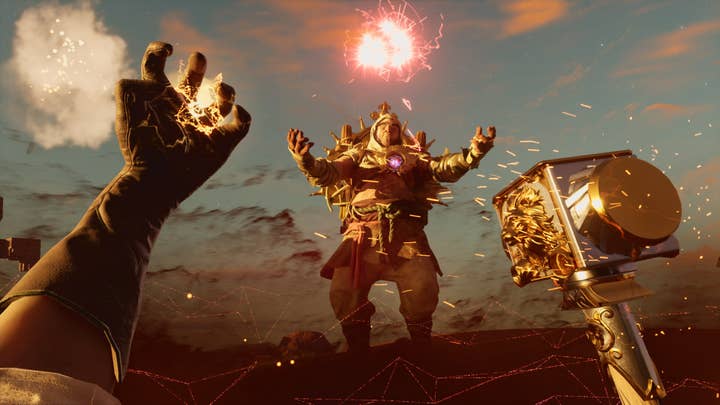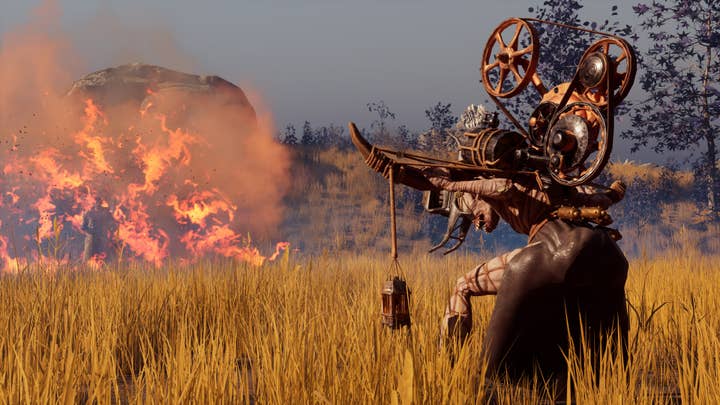Nightingale developer at an Inflexion point
Ex-Bioware GM Aaryn Flynn reflects on five years building a new studio, and getting back to values the Mass Effect dev "stopped honoring" after the EA acquisition
Five years ago, we spoke with former Bioware general manager Aaryn Flynn as his new Edmonton-based development studio was announced as part of the cloud computing startup Improbable.
The studio has since severed ties with Improbable and adopted the name Inflexion, and with it launching its debut game Nightingale into Early Access this week, we speak with Flynn about what he's learned from the experience of shepherding a new studio to this point.
It's a broad and open-ended question (perhaps obnoxiously so), and Flynn thinks for a moment before choosing which learning to share.
"I've learned about the incredible responsibility that studio heads have around preserving culture and ensuring you have a strong, vibrant, diverse culture within your studio," Flynn begins.
"A lot of what EA does is excellent, and they do very good work, but they were different sets of values and different approaches"
"A lot of the lessons I've tapped into here to lead Inflexion are lessons we started to learn at Bioware 20+ years ago, and then I would offer that we stopped honoring and stopped valuing [with] the acquisition by Electronic Arts. A lot of what EA does is excellent, and they do very good work, but they were different sets of values and different approaches.
"What I find myself doing is recalling the times when I was a software developer or taking on a big challenge at Bioware when we were independent and asking myself, 'Did we learn something there that would be valuable in this situation?' And more often than not, there was something there. I find I'm going back sometimes 20 years, when managing certain things or having certain thoughts, as opposed to any more immediate experiences."
He gives two examples of such learning experiences.
"The obvious one would be delaying a game," Flynn says. "We've delayed our game a few times now. Bioware was very famous for delaying games when it was independent, not so much when it was part of Electronic Arts. And that's just two different views on when to ship and what it means to be a successful studio, right? At Bioware when it was independent, the only thing that mattered was game quality."
When Flynn started with Bioware, it was doing work-for-hire, and the studio couldn't afford a misstep.
"We were on contract with other studios and publishers, and we needed to ship a great game so there would be another group out there willing to hire us to do it again," Flynn says. "If that game was poorly received, the risk was that nobody would be knocking at our door to do it.
"In delaying Nightingale, it's always been in pursuit of doing our best to make a game that's going to resonate with new players especially. Because who's Inflexion? We're nobody. We don't have what other studios have built up over time, so we have to put out a game that's a good game.
"It should be good enough that it can pay the bills and secure people's futures. That's exactly what the founders at Bioware Ray [Muzyka] and Greg [Zeschuk] always wanted us to do there, just work hard enough so we can get a few more years at this, then work hard again and keep doing this."

While Tencent is a major investor in Inflexion – Flynn corrects us when we call it an owner after striking a deal with Improbable, but declines to get deeper into the specific relationship and arrangement between the companies – it has not been applying the same pressure around delays Flynn might have felt at Bioware under EA.
"Tencent has been nothing but gracious and supportive and aligned on the belief and recognition that we want to be successful with Nightingale and then build and grow and evolve from there," he says. "We don't want to miss on this and have a game that is rushed, or too early, or has obvious issues and bugs. So it's been a great partnership in that regard and I've greatly enjoyed collaborating with them on that.
"I feel a stronger desire to launch Nightingale under [Tencent] than I did when I felt all the pressure to launch games in a certain time period"
"They are the furthest thing from short-term thinking I've ever seen. The irony is that I feel a stronger desire to launch Nightingale under that environment than I did when I felt all the pressure to launch games in a certain time period or a certain quarter."
As for the second key lesson from Inflexion, Flynn points to the value of wearing multiple hats inside a studio's culture.
"At most AAA studios that I know of, the business becomes very much about specialization and about individual developers getting very, very deep into specific parts of how you build a game," Flynn says. "We didn't have that in the early days at Bioware. Teams were too small. I've really come to appreciate and re-embrace that idea here at Inflexion, and I think a lot of other people have too."
He doesn't dispute the value of specialists or the need to have people think deeply about specific practices, but he found upside in having developers on Nightingale experience the game's development from a variety of vantage points.
"I certainly appreciated all the leads doing it, and it gives you a little bit more flexibility and empathy in how you do your job as you understand what your teammates are going through," Flynn says. "You spend a bit of time with them and so you recognize what they're doing is quite difficult, and, 'if I could make a change that would really help them, I should do that.' I really appreciated that as something to get back to and embrace."
While it's not uncommon for developers outside AAA to wear multiple hats, Inflexion isn't exactly a tiny indie studio either. Flynn says Inflexion has about 150 employees, with around 125 developers on staff.
"We had so many building and crafting mechanics on the gameplay side of things that we were kind of building a survival crafting game really without even recognizing it"
Given that the studio and its first game were originally intended to showcase Improbable's cloud tech, we ask Flynn about what it was like working with the tech, and then pivoting Inflexion and Nightingale to their current forms.
"Nightingale was originally imagined as an MMO because of that technology Improbable had given us access to, and this notion that it would help us scale up like an MMO studio with all that incredibly hard to create backend infrastructure to support so many players," Flynn says.
"Ok, so maybe it didn't work out, but at the same time, you then say we don't have that now, so what can we do? And we had so many building and crafting mechanics on the gameplay side of things that we were kind of building a survival crafting game really without even recognizing it. So you took away that technology, and you at least had the early bones of a survival crafting game."

And even if the Improbable-powered version of what the studio originally set out to make didn't come together, Flynn doesn't sound like someone who wants a do-over on the deal.
"I definitely liked the opportunity," Flynn says of working with Improbable's tech. "I think what the big lesson there is that technology aside, we're all players and all players want very similar things. They want some sort of fantasy to be fulfilled, they want goals to go experience. They want to problem solve, to experience mastery and grow in their skills, and other things. Technology will always be in service of that because we're all human beings and human beings are wired very similarly in that way.
"If the technology is not in service of the more universal things we love and appreciate and desire as human beings, it's not going to work in any sort of broad fashion"
"So for whatever tech demo you might see where you might say, 'That's super impressive' whether because you have some sense of how the technology works or not, if the technology is not in service of the more universal things we love and appreciate and desire as human beings, it's not going to work in any sort of broad fashion. It's not going to resonate with the hundreds of millions or billions of gamers out there."
He applies that same line of thought to the latest highly touted innovation for game development, generative AI.
"I think if AI can satisfy the desire for interactivity, that's a huge opportunity for it," Flynn says. "Certainly where you see it getting traction right now is as a tool to help developers create. It's expensive and time-consuming to make content for games, and if AI can help us do that, amazing, that's great. Just do so fairly with respect to the laws and expectations of other creators.
"Then it will come to where it can do cool things around satisfying and generating content live, where it would connect to players and offer them those needs of interactivity and emotional connection, dynamically adjust games to make them more or less challenging so you can feel mastery… My opinion is it's probably going to offer some of the relatedness desires and motivations we have, so for social connections it could fill in some of the gaps there that sometimes happen
"I'm very excited to see what happens in the next three years as really smart people begin to implement these things and put them in places that answer those needs for players and do cool things."
.jpg?width=720&quality=70&format=jpg&auto=webp)








